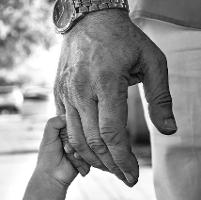Watching my young daughter expand her cognitive capacity alongside witnessing the cognitive challenges faced by my father, who lives with dementia, has highlighted to me the cyclical nature of human cognition in the most profound and personal way. As a new father, I am experiencing first-hand the joys of watching my child discover the world, making small yet monumental cognitive leaps that seem to happen every day. On the other end of the spectrum, I am also navigating the complexities of supporting my aging parents, as they face the challenges presented by my father's progressive cognitive impairment. The juxtaposition of these two life experiences has made me deeply contemplate the symmetry of life and of the aging process.
Thinking of human cognitive development as building a skyscraper, there are a series of progressive stages through which the building is erected. Infants lay the foundation, adding floor after floor as they learn new skills and abilities. These mirror the building blocks of cognition, starting with attention through to executive functioning. In Alzheimer's disease, it is as if this skyscraper starts to deconstruct, often in the reverse order in which it was built. This conceptualisation, which has been described as the “retrogenesis model”, proposes that the progression of brain aging in Alzheimer’s mirrors the developmental patterns of cognition in our formative years.
Watching my child gleefully learn new skills, reminds me of the skyscraper's construction. Each day brings a new layer, a new discovery, be it recognizing shapes, babbling, or discovering how gravity works. This is contrasted starkly with my father’s experience, where memories and skills that once were second nature seem to fade away in the most peculiar ways. Over dinner he is able to recall incredibly detailed anecdotes from many decades ago, but is unable to spell common words, and sometimes puts kitchen utensils in the strangest places. The complexity of my daughter’s expanding cognition provides insights into the complexity of my father’s cognitive challenges.
Having studied the ageing process for the entirety of my academic career, these parallel personal journeys have deepened my professional understanding. As we show patience and provide supportive environments for children learning new skills, we should equally extend that type of compassion and adaptability to older adults living with dementia. Poor mental health and cognitive impairment are challenges that many people live with hidden in plain sight. In contrast to older adults who use assistive devices for walking, which are plain to see, individuals that live with impairments that are equally as challenging, but are not immediately obvious, are often treated differently.
The cyclical nature of life becomes all the more evident in such situations. From birth, we embark on a journey of discovery, only to circle back to some of those early challenges in our later years. As someone who stands at this unique intersection — nurturing a new life while supporting an aging loved one — I cannot help but marvel at this symmetry.
As a professor who studies ageing, the retrogenesis model not only offers a scientific perspective on cognitive development and decline but also strikes a deeply personal chord with those of us experiencing these parallels in real-time. The intricate and often symmetrical nature of the human mind serves as a poignant reminder that every stage of life, with its challenges and triumphs, is invaluable and deserves understanding, compassion, patience, and love.
Rubial-Álvarez S, de Sola S, Machado MC, Sintas E, Böhm P, Sánchez-Benavides G, Langohr K, Muñiz R, Peña-Casanova J. The comparison of cognitive and functional performance in children and Alzheimer's disease supports the retrogenesis model. J Alzheimers Dis. 2013;33(1):191-203. doi: 10.3233/JAD-2012-121123. PMID: 22948284.
About the Author
Theodore D Cosco joined the Oxford Institute of Population Ageing in 2016 as a Research Fellow. Dr. Cosco is a Chartered Psychologist (British Psychological Society) trained in applied social research methods (MSc 2011, Trinity College Dublin) and epidemiology (PhD 2015, University of Cambridge), and Assistant Professor of Mental Health and Aging in the Department of Gerontology, Simon Fraser University. His research interests include resilience, mental health, and the interface between technology and healthy ageing.
Opinions of the blogger is their own and not endorsed by the Institute
Comments Welcome: We welcome your comments on this or any of the Institute's blog posts. Please feel free to email comments to be posted on your behalf to administrator@ageing.ox.ac.uk or use the Disqus facility linked below.













